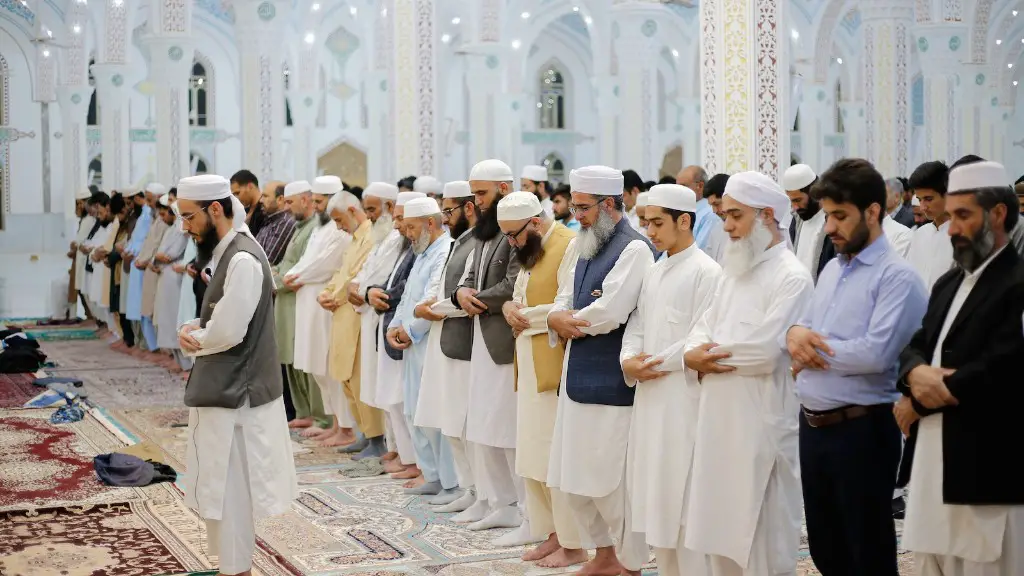Introduction
Reaching Heaven or attaining Moksha is a goal shared by every Hindu, marking the end of the cycle of birth and rebirth. In Hinduism, the journey to Heaven involves eliminating Karmic debts and reaching spiritual liberation. While each Hindu may pursue this goal in a unique way, there are certain paths and practices that can aid in achieving the desired result. In this article, the reader will learn about reaching Heaven in Hinduism through the key concepts of Dharma, yoga, good deeds and merit accumulation.
The Concept of Dharma
Dharma is a key concept in Hinduism, having many meanings and implications. In a more spiritual sense, Dharma is the cosmic law that binds creation together and guides humans on the path toward Heaven. To progress towards attaining Moksha, Hinduism teaches that one must lead their life according to Dharma, which implies fulfilling one’s moral, ethical and religious duties. This involves following the code of conduct prescribed to each caste, living with honesty and integrity and offering respect to fellow humans.
The Practice of Yoga
Yoga is an ancient practice of physical, mental and spiritual discipline that is trifold in nature, consisting of Yama (observance of moral discipline), Niyama (observance of personal discipline) and Asana (posture or posture-based exercises). In Hinduism, yoga is believed to be a powerful tool in aiding the journey towards Heaven. Primarily, yoga’s focus on balance and self-discipline can be seen as beneficial in eliminating psychological and emotional burdens, while its physical poses can be used as a means of gaining mindfulness and tranquility.
Good Deeds and Merit Accumulation
Doing good deeds and accumulating merit are also important aspects to reaching Heaven in Hinduism. The scriptures state that one’s destiny is closely intertwined with the kind of good deeds they have done in their lives, such as caring for elders, helping those in need and following righteous principles. Similarly, accumulating merit through charity, fasting and pilgrimage can also help in the journey to Heaven.
The Role of Devotion and Faith
Devotion and faith also play an important role in reaching Heaven in Hinduism. Hindus believe that faith in one’s chosen deity (or a devotional practice) can have a cleansing effect on their souls and can help to rid themselves of Karma. Devout Hindu followers sometimes choose to engage in lengthy pilgrimages and rituals to their selected god or goddess, which they believe can help them progress in their quest towards Heaven.
The Power of Chanting and Mantras
The chanting of mantras is another powerful tool for achieving heavenly liberation. For Hindus, chanting mantras can act like a spiritual gateway that helps to break through the veil of ignorance, allowing them to seek solace and enlightenment in Heaven. Popular mantras for spiritual liberation in Hinduism include the Mahamrityunjaya Mantra, Sri Rudram and the Gayatri Mantra.
The Concept of Jnana Yoga
Jnana, or knowledge, is an important concept in Hinduism and is seen as the highest path toward enlightenment. Jnana Yoga involves gaining spiritual insights through study and contemplation and using these insights to be liberated from the cycle of Karma and birth. Hindus believe that this path can be particularly helpful in understanding one’s place in the universe and in ultimately reaching perfection and Heaven.
Self-Study and Self-Inquiry
The last practice to focus on when discussing the journey towards Heaven in Hinduism is self-study and self-inquiry. Hinduism teaches that one must follow their inner wisdom and become aware of their hidden potential for ultimate spiritual realisation. To do this, one must make time for self-reflection and self-inquiry to gain an understanding of the truth of life and to be guided by one’s feelings and intuition.
The Power of Humility and Forgiveness
Humility and forgiveness also play their part in reaching Heaven in Hinduism. To be liberated from Karma and to reach spiritual salvation, it is essential for one to practice humility and forgive others for any wrongdoings. This kind of selflessness can help to rid one of negative emotions and set them on a path of pure understanding and enlightenment.
The Role of a Guru and Spiritual Teacher
Having a Guru or spiritual teacher is also beneficial in achieving heavenly liberation. A Guru can act as a guide and mentor in one’s journey of spiritual development, providing much-needed support and knowledge in uncovering the truth of one’s inner being. Hindus believe that Guru can be especially helpful in understanding one’s place in the cosmos and in ultimately attaining Moksha.
The Importance of Tapasya and Austerity
Hinduism also emphasizes the importance of tapasya and austerity in achieving heavenly liberation. Tapasya refers to the practice of abstaining from pleasurable activities and is thought to be beneficial in purifying one’s soul and controlling one’s senses. From fasting to silent contemplation, tapasya can help one to move towards divine understanding and away from materialistic desires.
The Significance of Meditation and Dharma
For Hindus, meditation also holds significant importance as a way to reach Heaven. Meditation helps to quiet the mind and can provide one with a sense of inner stillness. Through mindfulness and observation, Hindus can connect to the Dharma which lies within their souls and which can ultimately show them the path to liberation.
Conclusion
In conclusion, achieving Moksha or Heaven in Hinduism requires one to practice Dharma, yoga, and other spiritual disciplines, as well as self-study and self-inquiry. Humility, forgiveness and devotion play key roles in the path to Heaven, as is the need for one to practice tapasya and austerity and to meditate and chant mantras. With the correct knowledge and attitude, Indian followers can progress towards spiritual enlightenment and heavenly liberation.
